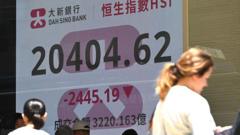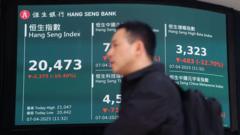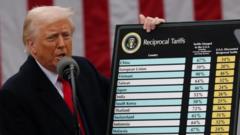As the U.S. enacts hefty tariffs, global stock markets experience notable declines, raising concerns that we may be on the brink of a bear market. This article examines the historical context of market crashes, the implications for individual investors and pension plans, and the broader economic ramifications of these tariffs.
Global Markets in Turmoil: The Impact of U.S. Tariffs

Global Markets in Turmoil: The Impact of U.S. Tariffs
The recent imposition of tariffs by the U.S. has led to significant fluctuations in stock markets around the world, alarming investors and raising questions about the potential for an economic downturn.
The imposition of sweeping tariffs by the United States has sent ripples through global financial markets, prompting a wave of concern among investors and analysts alike. As stock markets continue to plummet, many are questioning whether we are witnessing a market "crash," and what that could signify for ordinary investors.
The term "crash" is carefully applied in financial contexts, typically describing a drop of over 20% from a recent high within a short time. Historical instances of market crashes, such as Black Monday in 1987 or the Wall Street Crash of 1929, serve as grim reminders of how swiftly market fortunes can change. More recently, the stock market saw a decline of approximately 17% from its peak in February, with the UK FTSE index also experiencing sharp declines, albeit at a lower percentage.
As fears mount, the reality is that while we are nearing a bear market — defined as a decline of 20% — the situation, although serious, is not unprecedented. While individual stock ownership can expose investors to volatility, many people’s financial fidelity rests within pension plans. These plans typically include both defined benefit schemes, which guarantee a fixed income, and defined contribution schemes, where investments fluctuate with market performance.
In times like these, defined contribution plans, albeit vulnerable, are often insulated by the presence of safer investments like government bonds. As stock prices decline, bond values often increase, providing a buffer that could mitigate total losses in pension savings, especially for those closer to retirement who might have more investment security.
However, the implications of the market fluctuations extend beyond personal finances; they reflect broader economic realities. A company's stock price is generally indicative of its anticipated profitability, and the market's pessimistic view on current tariffs suggests companies may face declining profits and possibly be compelled to reduce staffing or cut back on investments.
The U.S. tariffs, which have intensified economic tensions with nations like China and many EU member states, could herald a potential economic downturn rather than merely a short-term financial setback. Therefore, investors are advised to consider the health of the economy as a critical indicator over the fluctuations in asset value tied to their pensions.
Overall, the intersection of tariffs and market response illustrates a pivotal moment for global economic stability, signaling that while fluctuations in stock values can be worrisome for individual portfolios, they often serve as a precursor to larger economic shifts that bear monitoring.




















